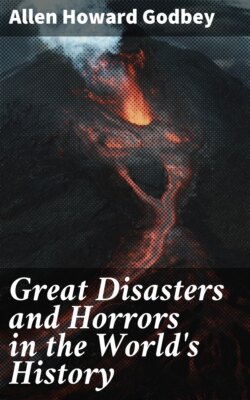Читать книгу Great Disasters and Horrors in the World's History - Allen Howard Godbey - Страница 12
На сайте Литреса книга снята с продажи.
Оглавление
VIEW AT JEFFERSONVILLE.
Passing through Louisville and crossing the river, the cyclone struck Jeffersonville, on the Indiana side. Here, upwards of eighty houses were seriously damaged, and quite a number totally destroyed. Two days later, the press gave the loss at $500,000—probably a great exaggeration, as the particulars given did not tally at all with the general statement. Singularly enough, not a life was lost, and only one or two persons were materially injured.
CORNER WALL AND FRONT STREETS, JEFFERSONVILLE.
The damage was mostly to roofs and top-stories, and the people were doubtless indoors and below. This, however, does not account for the deliverance of a number of persons in buildings which were completely destroyed. Possibly some of these may be accounted for by sudden explosions of buildings, such as has been noticed heretofore. The fragments would be much more apt to injure persons just outside than those within. The largely increased percentage of damage done to roofs and upper stories only shows how rapidly the storm was weakening. It could not go very much farther with its devastation. The old Orphans’ Home was wrecked; one old lady injured; a pastor’s house demolished, while two men in the upper story in some mysterious way escaped unhurt. At the foot of Front street, a shanty occupied by a man with wife and three children was lifted bodily and thrown into the river. The family would have been drowned had not some car-works employes rescued them, at the peril of their own lives. A number of guests, and some who came for shelter, were in a house at the corner of First and Spring streets. The shock of the tornado was followed by a hail of bricks and tumbling walls, but no one of the entire assembly was seriously hurt.
WRECK AT JEFFERSONVILLE.
The average American worships no god but Mammon. He may go to church and bow his head to Jehovah, but it is Mammon who keeps his heart. Between his devout amens he is thinking of the main chance. He can be converted and made religious; it is a great deal harder to make him honest. He is willing to sing the praises of the Lord, but he doesn’t like to foot the bills. Amid the sorrow and bereavement of a stricken city, the American was true to himself. Those who had lost house and friends, were asked to pay ten dollars for a carriage in which to follow the corpse to the grave. As about thirty victims of the storm were buried on Sunday, it may be inferred that the carriages in each procession were none too numerous. A sad sight was that of the four laundry girls, and the chamber-maid, all being borne together to their long home. Hardly less impressive was the burial at half-hour intervals of ten members of the I. O. O. F., killed in Falls City Hall. It was a profitable day for undertakers.
Nor did the officers of the Louisville and Southern Railroad forget their interests. They had for some time been desirous of regaining possession of their property controlled by the Monon Route. This they did in the confusion, dismay and darkness, immediately following the storm.
The writer does not wish to do any injustice to his people. Such items present but one side of the American’s character. He is a strange mixture of grasping greed and warm-hearted generosity. The latter is an inborn trait; the former in-drilled. We live in a rushing age. We are no more in a hurry about being rich than we are about a score of other things. Haste is a national characteristic.
Further, our people are brought up with peculiar ideas of success in life. Everything is reduced to a basis of cold cash. A man may be learned, talented, industrious; but all these things are counted for naught if he is not also wealthy. So our young people are brought up to think that money-making is the one business of life; and as a result the business world is full of those who resort to sharp practice and questionable methods, merely because they have been taught to subordinate honor and equity to gain-getting. Yet, the warm sympathies and native generosity of our people are continually coming to the front, in a way that, in view of the other traits, is sometimes amusingly inconsistent. Men who will haggle almost
LOUISVILLE TORNADO—CORNER TENTH AND MAIN STREETS.
about the price of a pin, or make their living by wild or fraudulent speculation; nay, even professional gamblers, or worse characters, are prompt in responding to the wail of a distressed city or state. After all, we are brethren. Yet, our good and bad qualities are so thoroughly mingled that we must continually rob Peter to pay Paul.
The American has another prominent trait—independence. He does not accept aid, as such, when he feels he can do without it: nor does he wait for demands of help, when he hears of great misfortunes that have befallen his fellow countrymen. Leigh Hunt once asked a very ragged and forlorn Irishman, “Why don’t you ask for alms?” “Alms, is it? Sure and isn’t it begging I am with every bone of my body?” The average American is generally quick to recognize a case that speaks for itself. To Louisville, in the hour of her calamity, came tenders of help from many quarters, and these offers would have been greatly multiplied, had not the citizens declined the proffered assistance. They felt that the resources of the city were equal to the necessity. They were grateful, but self-reliant.
